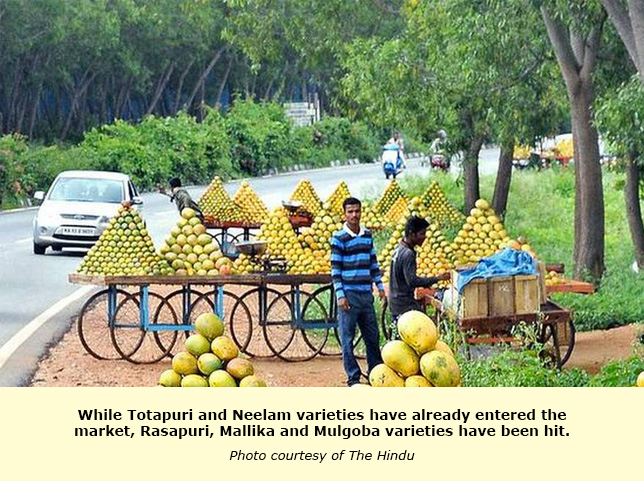Mangoes are synonymous with hot summer months, and this season they will be as delicious as ever, but be prepared to pay more. The fruit has already made its debut in the market, but in small quantities and in very few varieties.

Mango growers have suffered crop loss owing to untimely rain and the yield is expected to reduce by half. “The normal yield from the State is in the range of 16 to 18 lakh tonnes. This year, however, our estimate pegs it at around 8 to 10 lakh tonnes only,” said L. Gopalakrishna, chairman, Karnataka State Mango Development and Marketing Corporation Ltd. “That said, the quality of the fruit and pulp is expected to be better,” he added. While varieties such as Totapuri and Neelam, have already entered the market, the yields of Rasapuri, Mallika, and Mulgoba varieties have been hit, he said.
Untimely rain in February, which is the flowering season for mango crop in south Karnataka, especially in Kolar and Chickballapur, led to loss of flowers leading to lower yield this year, said Srinivas, chairman of Chickballapur Mango Growers’ Association. He added that good rain in 2017 after three consecutive drought years, had increased the moisture content in the soil leading to “good vegetative growth of plants” which has reduced fruit bearing trees this year. “Both factors put together have reduced the yield,” he said. Adireddy, another mango grower from Kolar, said he hoped mango prices would be higher this season. “Last year, wholesale prices were as low as Rs. 13 a kilo. But this year we expect the price to go up to at least Rs. 20 a kilo,” he said.
A senior procurement official from a leading retail chain said that apart from the Totapuri , all other varieties are selling for over Rs. 100 a kg. Most of the mangoes in the market today are from Vijaywada and mangoes from the State are scheduled to hit the market only later. This crop is still in the fruit-bearing stage now and farmers are keeping their fingers crossed as to how ongoing mango showers will pan out in the State. “The fruits are forming now and rain is needed. But hailstorms being reported in multiple parts of the State will hit fruit bearing of mango trees and the yield may reduce by another 10 to 15%,” said Mr. Srinivas.
Written by K.V. Aditya Bharadwaj, The Hindu
